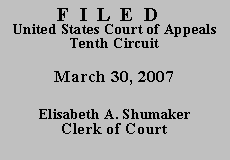

UNITED STATES OF AMERICA,
Plaintiff-Appellee,
v.
ARTHUR ARCHULETA, a/k/a Arthur
Archuletta, a/k/a Art Archutetta,
Defendant-Appellant.
Before BRISCOE, McKAY, and
McCONNELL, Circuit Judges.
Defendant pleaded guilty to being a felon in possession of a firearm in violation of 18 U.S.C. § 922(g)(1), and was sentenced to thirty-three months' imprisonment based on a four-level increase under United States Sentencing Guideline § 2K2.1(b)(5).(1) This case comes to us on defense counsel's motion to withdraw as counsel. In compliance with Anders v. California, 386 U.S. 738 (1967), he has filed a brief in support of that motion. That brief states that the district court's application of § 2K2.1(b)(5) poses the only arguable issue for appeal.
Defendant was charged in Utah state court with aggravated assault with a dangerous weapon(2) following a domestic dispute in which evidence indicates that Defendant pointed a loaded, 9-mm weapon at his girlfriend and her seven-year-old son. The charge was dropped, however, following apparent mismanagement of the prosecution. The district court nevertheless relied upon this information, contained in the pre-sentence report ("PSR") filed in conjunction with Defendant's federal § 922(g)(1) crime, in deciding to apply the sentencing enhancement. At sentencing, defense counsel objected to the inclusion of and reliance upon this information in the PSR because the state charge was never prosecuted and no facts relating to this charge were admitted by Defendant in his guilty plea. The district court denied the objection:
Based upon defendant's own post-Miranda admission, combined with the evidence presented by the government in this case, including photographs, a 911 audiotape and videotape of interviews, the Court finds by a preponderance of the evidence that the defendant directly used one of four weapons in his possession to engage in behavior amounting to aggravated assault . . . .
(Sentencing Tr. at 12.)
In his Anders brief, defense counsel asserts that the district court's reliance on facts alleged in the PSR relating to the aggravated assault charge raises no nonfrivolous appealable issue.(3) In support of that position, he cites United States v. Wolfe, 435 F.3d 1289 (10th Cir. 2006), which reaffirmed, post-Booker, our pre-Booker decision that unobjected-to facts contained in a PSR constitute admissions of fact. Wolfe does not apply, however, to the instant situation because defense counsel objected at sentencing to the use of this evidence, pointing out that the state charge was never prosecuted and that Defendant denied the incident ever occurred.
Nevertheless, in United States v. Magallanez, 408 F.3d 672, 684-85 (10th Cir. 2005), we held that even after Booker, facts relevant to sentencing need only be proved by a preponderance of the evidence, so long as the Sentencing Guidelines are treated in an advisory fashion. The district court correctly treated the Sentencing Guidelines as advisory, and the court's statement correctly and concisely conveys the evidence upon which it relied in finding that a preponderance of the evidence warranted the § 2K2.1(b)(5) enhancement.
Accordingly, after reviewing the Anders brief and the record on appeal, including the PSR and sentencing transcript, we GRANT counsel leave to withdraw and AFFIRM the judgment and sentence.
Entered for the Court
Monroe G. McKay
Circuit Judge
*. This order and judgment is not binding precedent, except under the doctrines of law of the case, res judicata, and collateral estoppel. It may be cited, however, for its persuasive value consistent with Fed. R. App. P. 32.1 and 10th Cir. R. 32.1.
1. Section 2K2.1(b)(5) was renumbered as § 2K2.1(b)(6) in the 2006 edition of the Sentencing Guidelines. For the sake of consistency, we will use the numbering that existed at the time of sentencing. The section directs that "[i]f the defendant used or possessed any firearm . . . in connection with another felony offense, . . . increase [the offense level] by 4 levels."
2. Under Utah Code Ann. § 76-5-102(1), assault is defined as "(a) an attempt, with unlawful force or violence, to do bodily injury to another; (b) a threat, accompanied by a show of immediate force or violence, to do bodily injury to another; or (c) an act, committed with unlawful force or violence, that causes bodily injury to another or creates a substantial risk of bodily injury to another." Aggravated assault, defined as assault using a dangerous weapon or other means or force likely to produce death or serious bodily injury, Utah Code Ann. § 76-5-103, is a third degree felony punishable by up to five years' imprisonment, Utah Code Ann. § 76-3-203.
3. Counsel's brief contains a certificate of service certifying that he furnished Defendant with a copy of counsel's brief. Defendant has not filed a brief indicating disagreement with his counsel's position.